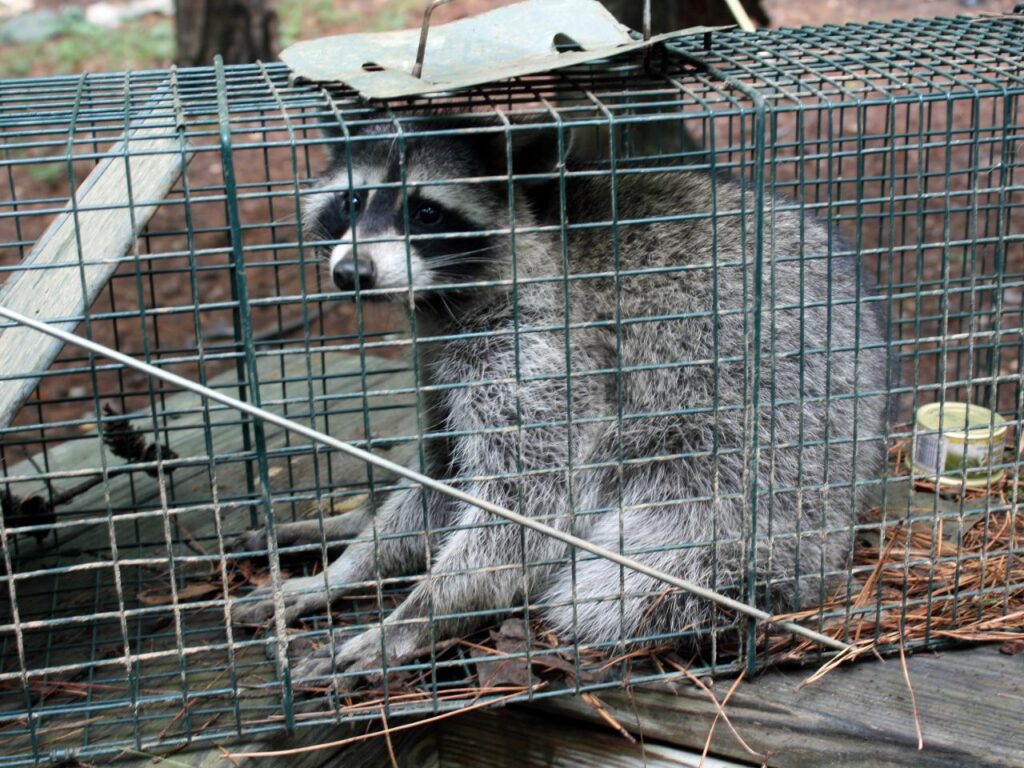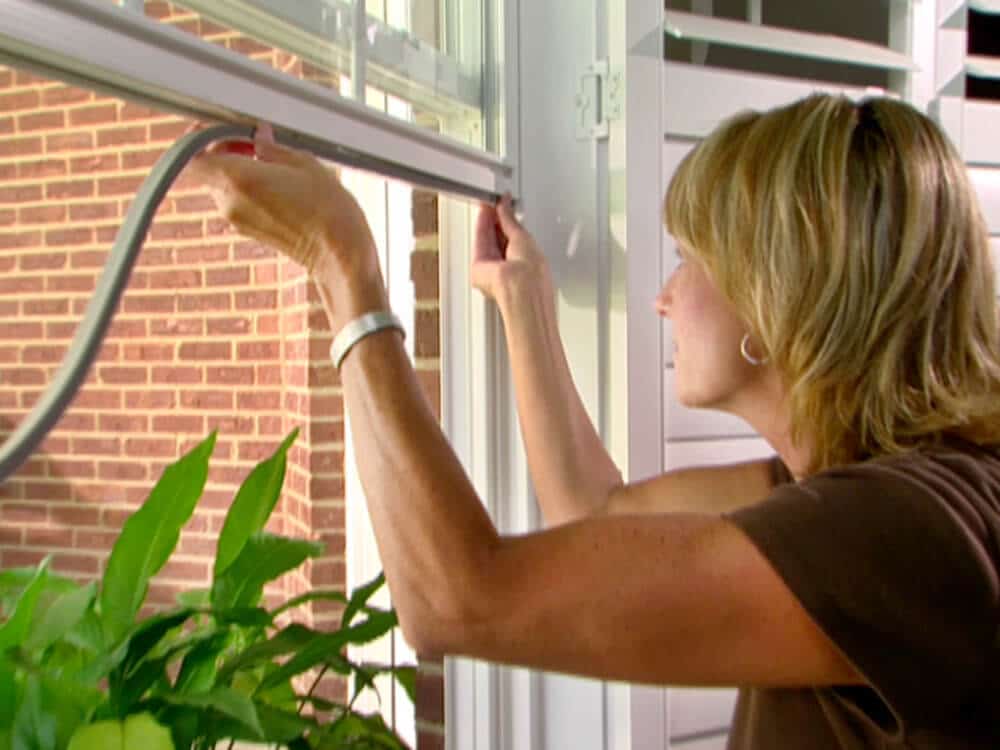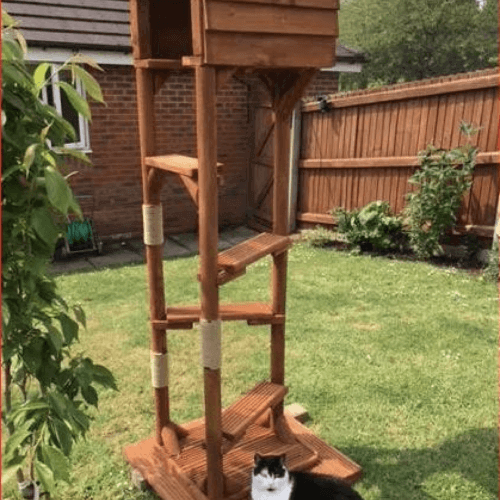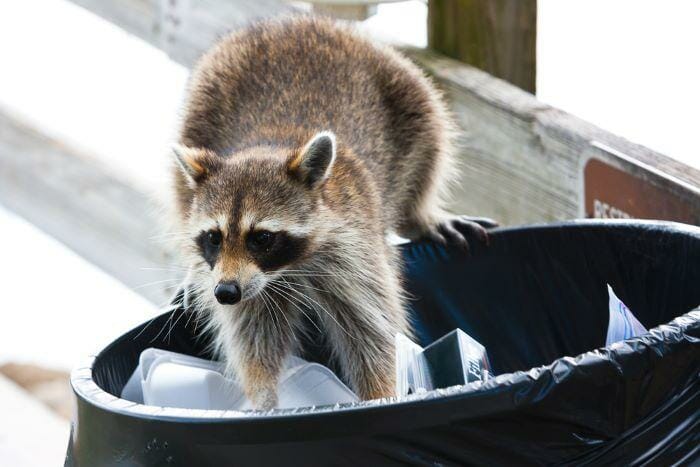Raccoons are some of the worst creatures to share space with.
They are cute from afar but they can wreak havoc to you and your loved ones.
For one, these critters are notorious for digging through trash in search of food. In the end, they leave leftovers all over the garage or the lawn.
If they manage to make their way to your house (which is highly likely), trust them to destroy your structure, make nests everywhere, leave droppings, you name it.
The worst, though, is that they carry deadly parasites that may spread diseases to your pets.
Raccoons and feral cats have a lot of characteristics in common. This makes removing the former hard to do.
Most strategies used to get rid of raccoons end up disrupting feral cats as well.
However, if you dig deeper, there are a few that are specific for raccoons only.
Which ones are these? We have listed them down below.
1. Live-Trap The Raccoons

One of the most effective methods of getting rid of raccoons is manually trapping them.
See, these rodents are experts at gaining entry into your house. If you think they are satisfied with scavenging food outside on the lawn, you are badly mistaken.
If they smell food inside the home, they will look for any crack to let them in.
Female raccoons with babies prefer living in the attic where it’s safe and secure for their young ones. This is double the trouble as the rodents can damage your home in many ways.
Live-trapping a raccoon is not an easy thing to do but one which works better than the rest.
Live traps come in all shapes and sizes. Walk over to your local wildlife store and order one that will safely and effectively remove them.
Feral cats are not easily found in your home, so this strategy will keep them coming back around the home.
2. Seal All Openings

Trapping raccoons is only half the battle. If you still have openings from where they first made their way to your home, it is only a matter of time before others invite themselves again.
To take care of the problem once and for all, you might want to seal every last crack in your home.
This includes cracks in the walls, vents, roof openings, cracked windows and doors, broken pipes, and more.
You can close the gaps using different strategies including cement, steel wool, lath metal, metal sheeting, or hardware cloth.
Small holes are best filled with steel wool with caulk around it to keep things in place. Use the other materials for larger holes.
Don’t forget to seal gaps around trailer skirting and the base of the house. Include solutions for closing up garage holes as well.
If the job gets overwhelming, hire expert help.
3. Use Scents

You can also get rid of raccoons without interfering with feral cats by utilizing scents.
Raccoons, just like cats, heavily rely on their senses of smell to find food.
The difference is that certain scents irritate the life out of the rodents without harming the felines in any way.
Some of the scents raccoons cannot stand include the following:
A. Epsom salt
According to Skeddadlewildlife.com, raccoons hate the smell of Epsom salt.
In simple terms, this is a magnesium sulfate crystal mostly used in body baths to ease pains and aches. It offers relief and soothes soreness and injuries.
When spread over an area, it gives off a mild scent that raccoons find very repulsive.
The smell also irritates their cavities and they don’t care for it.
Feral cats, on the other hand, don’t have an issue with Epsom salts.
The first thing you want to do is to purchase high-quality Epsom Salt from a reputable source.
Sprinkle it over the yard, especially around the garbage bags and areas where the raccoons love to nest.
Be generous with the salt and reapply after a few days particularly if it rains.
B. Use An Ammonia Spray
Second on the list of undesirable scents, a mixture of half ammonia and half water can also send your raccoon packing.
Ammonia is a common smell in urine. Raccoons hate the smell of urine.
Some people actually collect urine from foxes and other predators and use them to repel these critters from their homes.
Why go through all that trouble when you can mix ammonia and water and mimic the same results?
You can also use an ammonia-based cleaner to achieve the same purpose.
Ammonia is too pungent for raccoons and also disrupts their ability to detect the smell.
In case they taste food with ammonia in it, the taste lingers for a while making them desensitized.
Spray generous amount of ammonia in designated areas just like the case above.
Please note that this method only works for a limited amount of time.
Most raccoons get accustomed to the smell after coming in contact with it severally.
Once they do, the scent will not deter them in any way.
C. Essential Oils
While humans find essential oils fragrant and effective in treating a range of diseases, raccoons and cats cannot stand them.
Each party has its fair share of oils that irritate them a lot.
For raccoons, these include the likes of peppermint, garlic, and cinnamon.
Spray these on the garbage tins and watch the critters run for their dear lives never to come back again.
Feral cats can stand these smells unless they are too concentrated for their little noses.
D. Raccoon Eviction Fluid
There’s such a thing as a raccoon eviction fluid used to deter raccoons from private properties.
This special product is a fluid with the scent of a male raccoon.
When placed near a pregnant or nursing female raccoon, it will cause her to retreat to another spot that is safe for her young.
Male raccoons are particularly known for murdering baby raccoons birthed by another male.
Female raccoons know this too well and try their level best to protect their babies from being killed.
Research on this method is still unclear but it is definitely worth trying.
Apply the fluid on the attic, chimneys, and any other area used by a pregnant or nursing raccoon.
It will release its strong scent and hopefully force the rodent to leave the home for good.
4. Use An Elevated Feeder

Here’s another simple trick you can also utilize to deter raccoons from coming around to eat your pet’s food.
Elevated bowls work because cats are climbers while raccoons are not. They’d rather feed from low-to-the-ground food sources.
Cats, on the other hand, can jump high if it means beating hunger.
Give elevated pet bowls a try and see if raccoons will stop coming around the yard.
Just keep in mind that raccoons are very intelligent animals. They can easily figure out how to reach for the food at the elevated bowl, so don’t bank too much on this method.
Summary
If you have had a raccoon infestation in your home before, you are familiar with the trouble the rodents bring to humans and their pets.
Not only are they a nuisance but they are hard to deal with. This is especially true if you are looking to get rid of them without chasing feral cats from your property.
The tips suggested here are worth a try. If nothing works, consider hiring professionals to take care of the mess for you.

Hi! I am Eleanor Price. I started this website after my cat, Louie, almost died from a case of botulism (a type of food poisoning often caused by bacteria that grow on food items). Turned out that my cat’s diet was the problem. I have made it my duty to provide the best information and recommendations about everything cat lovers need to know about their felines’ health and wellbeing. My goal is to find the most informative content on anything feline-related and share it with fellow hardworking kitty lovers.

